We’re about to hold our second annual GamesBeat Summit event on May 3-4 at the Cavallo Point. I’m very excited to say that we’re going to have a lot of very interesting people in the room. We’re still signing up people to attend, and we hope to have about 180 guests overall.
Right now, the roster includes 39 CEOs and company founders among the attendees. We’ve also got a lot of CMOs, senior vice presidents, chief operating officers — and then there’s me. Our theme is focused on the narrative of underdogs in the game business and the strategies they use to win. We’re trying to get the right people in the room, including executives from the platform companies. Right now, we have attendees from Microsoft, Facebook, Google, Unity, Epic, and a big company in the vicinity of Cupertino, Calif.
We have talented game developers like Sam Barlow and Will Wright coming, investors who have funded many of the game industry’s important startups, and media luminaries like Robert Scoble and Will Mason of UploadVR. We’ll have attendees from the critical companies who can help developers with tasks like monetization, distribution, and discovery. If you want to take your business into a new territory, we’ll have the experts there to do it. My hope is to gather everyone who can help make more deals happen in the $99 billion game ecosystem.

Above: GamesBeat Summit in 2015.
Games are everywhere, and everything is a game. (OK, well, they’re 60 percent of U.S. households, according to the Entertainment Software Association.) Games have gone global. Games find their way onto every new platform, whether it’s mobile, virtual reality, or augmented reality. Platforms that support games are more successful. We have seen so many changes. Fifteen years ago, what sane person would have predicted that a 100-person mobile game company would arise in Siberia? That shows that the gaming world is flat and that good game developers can come from anywhere. We’ll have a roundtable with Kabam’s Kent Wakeford on this topic.
Robbie Bach will lead off the discussion with a look back at the launch of the original Xbox and the lessons that it holds for those creating new platforms like VR. Tim Sweeney of Epic Games will tell us about the meaning of openness in a world with many game platforms. Rami Ismail of Vlambeer will help voice the concerns of the indie game development community, and Noah Falstein of Google will give our lone solo talk about game design lessons for VR.
Peter Phillips of Marvel will open day two with an examination of gaming and the Marvel franchise. Owen Mahoney will update us on his view of gaming as a unique blend of art and commerce in a fireside chat with me.
Then, at mid-day on day two, we’ll do something new. We’ll have a round of “lightning talks” from five very interesting leaders. Tim Merel, the CEO of Eyetouch Reality and managing director of Digi-Capital, will speak on the reality of AR/VR business models. Sam Barlow, the executive creative director at Interlude, will talk about how imagination is still the most powerful game engine. Don Daglow, the CEO of 4thRing, will promote game industry mentoring in his talk. Kathy Astromoff, the vice president of game developer success at Twitch, will update us on the fast-growing community. And Amy Jo Kim, a mentor at Maven Ventures, will talk about getting to alpha.
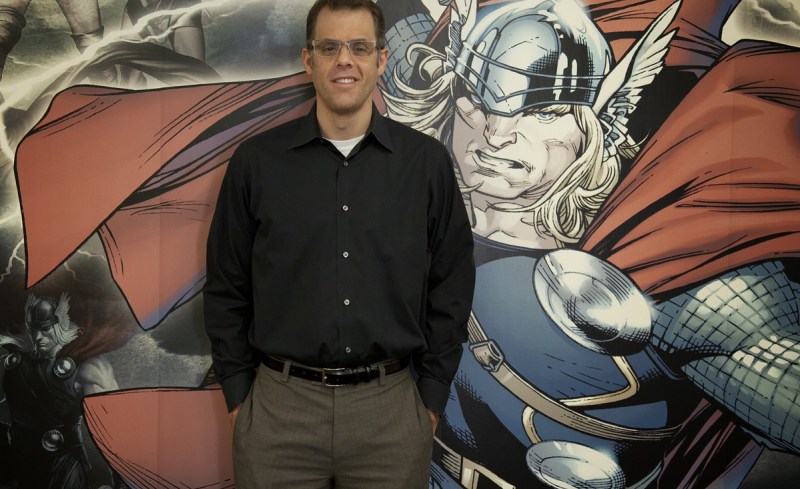
Above: Peter Phillips is the executive vice president and general manager of interactive and digital
distribution for Marvel Entertainment.
We’ve got a series of roundtables on monetization, mobile engagement, gaming regions, game deals, ad fraud, and managing crunch. These frank and honest sessions should be eye-opening. We’re also going to have fun with a team-building exercise.
Jeri Ellsworth of CastAR will talk about the underdog’s tale of creating a new augmented reality platform in a chat with UploadVR’s Will Mason. John Riccitiello of Unity has been warning about a wave of disappointment coming in the wake of VR hype, and he’ll update us on his views in a fireside chat with Entertainment Software Association CEO Mike Gallagher. Mihai Pohontu of Samsung will talk about how that big company is making investments in game platforms and VR. And Paul Bettner, the CEO of Playful and creator of the Lucky’s Tale game on the Oculus Rift, will take us into the future with a talk on VR with GamesBeat’s Jeff Grubb.
The GamesBeat event is about the global business of gaming, which is growing in so many ways and becoming a bigger part of the entertainment and technology industries. We’ve designed this year’s summit to be a more intimate experience for the leaders of the gaming world. Virtual reality, augmented reality, and esports are re-energizing developers. Our speakers will shed light on the landscape and help you make the right decisions so your company can grow. We’ll have a lot of fun events, like a Microsoft reception with s’mores and whiskey.
If you want to apply for an invitation, please click here. And here is the full agenda.

Above: The International Game Developers Association chief Kate Edwards talks game-design job satisfaction with USGamer senior editor Kat Bailey at GamesBeat 2015.
Our previously announced speakers include:
Kate Edwards, executive director of the IGDA. She will address the topic of uncompensated crunch time in a roundtable at the summit. Edwards said that the game industry has always had extreme works hours that eventually became accepted as “normal.” These extended periods of crunch time require people to go work far beyond standard hours to make up for the company’s inability to effectively manage a project and/or manage creative expectations for a given time frame. While crunch is a reality of most every creative medium, there is a better way to manage its infliction on employees, primarily by instituting a policy of upfront disclosure and enabling employees to choose the kind of conditions in which they will create, Edwards said.
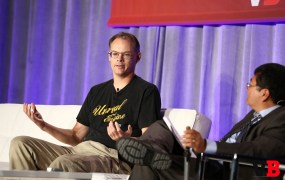
Above: Tim Sweeney, the CEO of Epic Games, on stage at GamesBeat 2015 with Dean Takahashi.
Tim Sweeney, CEO of Epic Games. Sweeney has spent 25 years as graphics guru and maker of games such as Unreal and Gears of War, as well as the upcoming release Paragon. Sweeney is one of the brains behind the Unreal Engine, one of the vital tools for the development of 3D games on everything from mobile to high-end virtual reality titles.
He also understands that business, technology, and games are intimately linked. He has been a passionate speaker on openness for the PC and recently tangled with Microsoft on its approach to openness in Windows 10.
Sweeney has been one of the industry’s seers when it comes to 3D graphics in video games. He recently predicted that game developers would use VR to create games, and he gave a talk at the ChinaJoy 2015 event, where he predicted that perfect augmented reality glasses could one day mean that we won’t need big-screen monitors, TVs, or even smartphone or tablet screens. His reasoning: If we have the equivalent of 40-feet screens in front of our eyes at any time we want (maybe in the next decade), the rest of the screens in our lives become superfluous.

Above: Paul Bettner
Lucky’s Tale creator Paul Bettner, the CEO of Playful. Bettner’s 3D platformer title Lucky’s Tale is bundled with the Oculus Rift virtual reality headset, and it’s a blend of Crash Bandicoot and Mario in a new dimension. Bettner started Playful to create VR experiences. His previous studio, Newtoy, was acquired by Zynga, and Words With Friends is still one of Zynga’s top titles. Bettner is one of the few game developers who has already launched a major title for the VR headsets, and we’d like to know what he’s learned.
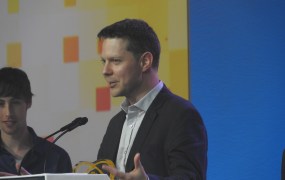
Above: Sam Barlow wins grand prize for Her Story at IGF.
Sam Barlow, the creative director at Interlude. Barlow was a big winner at the Game Developers Choice Awards and the Independent Games Festival in March. Her Story uses full-motion video to tell the tale of a missing man. It focuses on police interviews with his wife, Hannah Smith, portrayed by British musician Viva Seifert. Barlow is a game director and writer who has been making games since his cult 1999 title Aisle. Barlow has an extensive history of making games that create deep personal connections with their players. With Silent Hill: Shattered Memories, he created a classic that psychologically profiled Wii gamers.

Above: Dan Fiden, the chief strategy officer at FunPlus.
The investor panel speakers include Dan Fiden, the chief strategy officer at Beijing-based FunPlus, which recently set up a $50 million fund to invest in mobile games and other game-related companies. He’ll be joined in the roundtable by Jay Eum, the managing director at Translink Capital; Phil Sanderson, the managing director at IDG Ventures; and Sunny Dhillon, a partner at Signia Venture Partners. They’ll talk about everything from virtual reality to mobile game investments and what draws their attention as seasoned investors in the game startup ecosystem.

Above: Kathy Astromoff, the vice president of developer success at Twitch.
Kathy Astromoff, the vice president of developer success at Twitch, the largest game livestreaming video platform and community for gamers. She has extensive experience in game developer relations and business marketing, including stints at Sega, Ageia, and Game Developers Conference parent UBM. Kathy has contributed to the International Game Developers Association in various roles, including foundation trustee, board chair, and women’s SIG contributor. She follows Cal football through thick and thin, and her favorite scotch is not too peaty.

Above: Amy Jo Kim, game designer.
Veteran game designer Amy Jo Kim will talk about helping clients find their “alpha moment” in game design and how that can level the playing field for game developers around the world. Kim has a background in neuroscience, computer science, and psychology. She has applied that knowledge to both game design and web community architecture. Her design credits include Rock Band, The Sims, Ultima Online, eBay, Family.com, Nytimes.com, Indiegogo.com, and numerous startups. In 2000, she published the book Community Building on the Web. She has a doctorate in behavioral neuroscience from the University of Washington and is an adjunct game design professor at the USC School of Cinematic Arts.
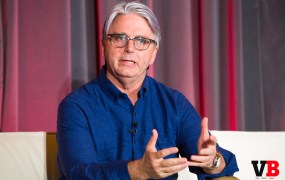 John Riccitiello, the CEO of Unity Technologies, is returning for the second year to our GamesBeat Summit. Riccitiello has been expanding Unity’s reach as a game engine that is democratizing game development by making it easier than ever to make games and publish them across platforms. And now he is adding services for game developers such as advertising and monetization. The former CEO of Electronic Arts is also reportedly raising money at a very healthy valuation. We’re looking forward to quizzing him on a variety of topics in a fireside chat.
John Riccitiello, the CEO of Unity Technologies, is returning for the second year to our GamesBeat Summit. Riccitiello has been expanding Unity’s reach as a game engine that is democratizing game development by making it easier than ever to make games and publish them across platforms. And now he is adding services for game developers such as advertising and monetization. The former CEO of Electronic Arts is also reportedly raising money at a very healthy valuation. We’re looking forward to quizzing him on a variety of topics in a fireside chat.
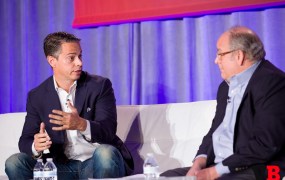
Owen Mahoney, the CEO of Nexon. Mahoney is a veteran of the GamesBeat stage, and he continues to make interesting strategic moves in gaming. Most recently, the company acquired DomiNations developer Big Huge Games, a Western studio founded by game pioneers Brian Reynolds and Tim Train. Mahoney has been signing up a lot of famous game developers, mostly by pitching gaming as an art form. He spoke at last fall’s GamesBeat 2015 event, and we’re happy to have him back.

Jeri Ellsworth, the cofounder of augmented reality glasses maker CastAR, will talk about augmented reality glasses based on the company’s new platform. CastAR glasses will be able to overlay animations and other imagery on top of the real world. It’s a creative product from an interesting hardware tinkerer. Ellsworth taught herself how to design chips and became known in 2004 for creating a Commodore 64 system on a chip with a joystick. She went on to become a hardware hacker and was part of a team of researchers at Valve, the maker of the Half-Life games and the new SteamVR virtual reality technology.
Mike Gallagher, the CEO of the Entertainment Software Association. Gallagher is returning to speak as the chief lobbyist for the game industry. We caught him recently at the DICE Summit in Las Vegas, where he aggressively defended and praised the game industry for its fast growth and expansion to new platforms. Gallagher is the chief spokesman for an industry that has reached $99.3 billion in sales around the world, according to market researcher Newzoo.
Gallagher noted that just two decades ago, video games were a niche. Now games are an economic driver, he said, with $23.5 billion in the U.S. in 2015 sales across physical and digital segments. And they remain an innovative force in technology, too — just look at how games could be the killer app for virtual reality. The U.S. has 1,800 video game facilities (companies and offices), with more than 1,600 publishers and developers. And 406 universities have degrees or curricula in video games.
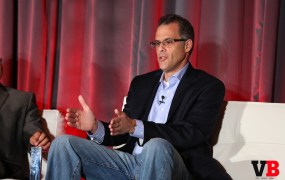
Peter Phillips, the executive vice president and general manager of interactive and digital distribution for Disney’s Marvel Entertainment. He oversees Marvel’s New York digital media division, which creates and manages web, app, and social media experiences. He also runs the Los Angeles video games unit, which oversees the development of multiplatform games, and the L.A. digital film and video distribution group.
Basically, he licenses game publishers and developers to make games based on Marvel properties, and that responsibility is a serious one. When he spoke at our event last year, he viewed the role as a “brand steward,” or being a caretaker who was very careful about what he allowed others to do with Marvel brands. We’re delighted to have him back for a fireside chat at a time just before the May 6 debut of Captain America: Civil War in theaters.
Robbie Bach, the former chief Xbox officer. Microsoft lost $5-7 billion on the original Xbox, launched in 2001. And it made billions of dollars on the Xbox 360. Depending on the time frame in which you look at it, this was either an insane waste of money or the finest strategic decision that Microsoft ever made. Robbie Bach had to make the call to do it or not. He was the chief Xbox officer from 2000 to 2010. After two console cycles, Bach decided to do work as a “civic engineer” to help fix both charities and governments. We look forward to a discussion of what Bach learned from his efforts and how they are relevant today to companies that are trying to establish new platforms. Bach recently wrote a memoir book, Xbox Revisited, about his time at Microsoft and his own efforts to fix our country’s civic problems.
Rami Ismail, the cofounder of Vlambeer. Ismail is one of the most visible independent game developers in the world. The cofounder of the Netherlands-based Vlambeer is trying to use that fame to give back to the indie community and do good. The studio’s has a signature style, and fans have supported it all the way. Five years ago, Ismail and Jan Willem Nijman started the company. Their hits include Super Crate Box (2010), Serious Sam: The Random Encounter (2011), Gun Godz (2012), Ridiculous Fishing (2013), Luftrausers (2014), and Nuclear Throne (2014). Ismail has also been active supporting indies with the Indie Press Kit, DoDistribute, DoToolKit, and GameDev world. Ismail is outspoken on social issues, and he has taken gamers to task for online harassment. And he remains a big advocate for the global gaming business.
Noah Falstein, the chief game designer at Google. Falstein has had a long history of making video games. But at Google, which doesn’t make traditional video games, you would think that he doesn’t have much to do. But he does. Falstein noted in a panel that I moderated last year that Google supports games across the whole spectrum, perhaps more so than any other company. Much of its focus is in getting the next billion people to play games on such platforms as Android devices and virtual reality.
At last year’s Game Developers Conference, Falstein talked about doing games using Google’s Project Tango, the augmented reality technology that can map the 3D space around you and, using a tablet screen or future augmented reality glasses, project an interactive experience into that space. You can conceivably play a 3D horror game inside your own house where you hide behind your own furniture to escape a monster. Falstein has also talked about creating games such as the massively multiplayer online mobile game, Ingress, which was recently spun out of Google as Niantic. Falstein has served in game design roles at the Inspiracy, Suddenly Social, NF Interactive, LucasArts, Dreamworks, and 3DO.
Neil Young, the CEO of N3twork. Young and Bob Stevenson launched N3twork as a social network based on interests groups in 2013. It didn’t take off as expected, so they pivoted last fall into mobile gaming. That was an unusual move, but it showed how flexible Young was in adapting to the fast-changing market. And, if anything, gaming has been changing fast in the past few years. It won’t be an easy path as big companies are starting to dominate the top-grossing games in mobile. But Young has pulled off some interesting feats in the past. In 2008, he started Ngmoco with Stevenson at the dawn of the iPhone era. Japan’s DeNA, a mobile and social gaming company, acquired Ngmoco for $400 million in 2010. Before that, Young spent years working on triple-A games such as The Lord of the Rings, The Sims, and the experimental Majestic game at Electronic Arts. He built his first game when he was 14.
Some of our topics include:
Monetization: Where mobile game monetization meets marketing and retention
You cannot monetize efficiently without first having an engaged audience. This discussion will host an open round table of mobile experts to dive into crafting the perfect balance between monetization, retention and marketing, creating a game funnel that generates revenue.
Deals: Follow the money
The conventional wisdom says that it’s smarter to invest in the emerging markets of augmented reality and virtual reality than in mobile games. But FunPlus recently announced a $50 million fund to invest primarily in mobile games. The overall surge of investment dollars into private gaming companies has been followed by a slowdown in recent months. Will this snail’s pace continue, or will we see certain segments start the upward cycle again?
Ad fraud: How to deal with it
There’s a dirty secret in mobile gaming when it comes to acquiring users. You have to be able to detect fraud to be able to make sure that you’re really monetizing the way you think you are.
Is the gaming world flat?
What are the ingredients necessary to turn a region into a hub for great game development? That’s a good question, and it’s an economic gold mine for any region that figures it out since games have become a $90 billion industry, according to tech advisor Digi-Capital.
Disclosure and choice: How we can manage “crunch”
Since its emergence, the game industry has always had a problem of extreme work hours that came to be accepted as “normal”. These extended periods of “crunch time”, wherein developers are expected to go work far beyond standard hours to make up for the company’s inability to effectively manage a project and/or manage creative expectations for a given time frame. While crunch is a reality of most every creative medium, there is a better way to manage its infliction on employees, primarily by instituting a policy of upfront disclosure and enabling employees to choose the kind of conditions in which they will create.
The evolution of engagement
Engagement has meant very different things for mobile gaming ads over time, and we’ll examine how to retain the attention of mobile gamers with ads today.
Our event advisory board includes:
- Sinjin Bain, CEO of MaxPlay
- Gordon Bellamy, visiting scholar at USC
- Seamus Blackley, Xbox cofounder and consultant
- Michael Chang, senior vice president of corporate development at NCSoft
- Daniel Cho, chairman at Innospark
- Kate Edwards, executive director at the International Game Developers Association
- Jay Eum, managing director of TransLink Capital
- Chris Fralic, partner at First Round Capital
- Bill Grosso, CEO of Scientific Revenue
- Perrin Kaplan, principal at Zebra Partners
- Tim Merel, founder and CEO of Eyetouch Reality and managing director at Digi-Capital
- Phil Sanderson, managing director at IDG Ventures
- Mike Vorhaus, president of Magid Advisors
- Sunny Dhillon, partner at Signia Venture Partners
Call for sponsors
If you’d like to sponsor, please send a message to sponsors@venturebeat.com.
Our sponsors include:
Platinum:
Microsoft
Gold:
YeahMobi
IronSource
Adjust
Samsung
Silver:
AdColony
TapJoy
Glispa
Invest in Canada




